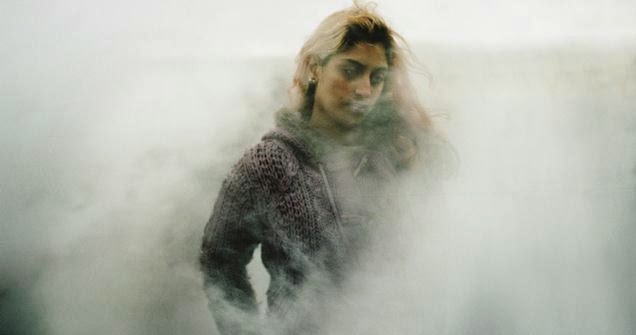
Cast: Nick Cave, Warren Ellis, Ray Winstone, Kylie Minogue, Blixa Bargeld
“You’ve dreamed yourself to the outside, and nothing can bring you back in.” Nick Cave
Sometime during your mid-fifties you will wake up on your 20,000th day on Earth. For most of us, it will pass without celebration or ignominy; one of so many days that skip gaily past as we stare on blankly, our backs turned against the future. But Nick Cave is not like most of us. In fact it’s hard to believe he has allowed a single day of his life to escape so casually unappreciated. In a career spanning four decades he has poked and prodded himself to breaking point, and shaped his discoveries into an endless torrent of melodious grumbling. That he took the occasion of his 20,000th day on Earth to open himself up to his own life and art is a great blessing. That he invited Iain Forsyth and Jane Pollard to document the event is a great relief.
’20,000 Days on Earth’ follows Cave during the recording of his latest LP, ‘Push the Sky Away’. Footage of his band recording in the French countryside is interspersed with scenes from his daily life on the south coast of England: lunch with long-term collaborator and friend Warren Ellis, a few hours helping his archivists sort through the myriad scrapbooks and photo albums of his life, and so on. Devoid of any particular moment - an announcement of retirement perhaps, or a world tour - the film provides a snapshot of Cave that feels all the more intimate and truthful for its arbitrariness. It feels more like the stitched together outtakes of a ‘Nick Cave’ documentary: all the moments between the clapper’s snaps, the quiet reflective meanderings, the anecdotes and naughty stories. It is unabashed and unreserved. It has a sort of sentimental, playful similarity to his friend Jim Jarmusch’s ‘Broken Flowers’: a man wakes up one day, and for no particular reason decides to come to terms with his past.
Clearly, Forsyth and Pollard have discovered that the only way to really understand Nick Cave is on his own terms and in his own time. An early section of the film sees Cave sitting with a man who we may assume to be a therapist; surely an excellent opportunity to get beneath the skin of one of modern music’s most provocative practitioners? No. Watching somebody of Nick Cave’s intelligence and creativity undergo psychoanalysis is almost laughable, he is so utterly in touch with his memories and feelings and the effect that various moments have had on his life. When asked to recall the first time he ever saw the nude female form, he describes “a girl with a white face” who was his first kiss, and who had a “profound effect” on his childhood, leading him to occasionally dress in women’s clothing to feel closer to her. When asked to describe his father, he recalls the moment, “my father took me aside and read the first chapter of Lolita to me.” All these memories are too fortunate, too complete, too perfectly ‘pre-artisic’.
But then we cut to footage of Cave recording the piano and vocals for ‘Give Us a Kiss’, and we are reminded that everything we will ever know about this man comes from his music. His art is his memories. This stunning, quiet, solitary piano piece performed in a studio, alone, tells us more about Cave than any number of hours searching through his archives. “Give us a kiss. One little sip sip sip, before you slip, slip, slip.”
Aside from the aural bliss of the studio footage, it’s in the moments when Cave is having fun with his memories that the film really comes to life. Listening to Cave and Ellis discuss the Meltdown festival that he curated, and invited Nina Simone to headline, is fascinating, intimate, and often hysterical. At an early point in the film he recalls how Simone wandered on stage, hunched and menacing, and left her gum on the piano. He brings the memory up with Ellis later at lunch, and Ellis casually mentions that he kept that gum, and still has it somewhere in the house. It is a rare treat to hear these two impassioned veterans discussing the music that has affected them. It’s a rumination on what music has been, leaving open the question of what it is now, and could become.
And then there are the ghostly apparitions that appear beside Cave in his car as he roams the outskirts of a grey and dreary Brighton. Ray Winstone, Kylie Minogue, and Blixa Bargeld all join Cave at various junctures (or junctions?) to help him relive past successes and failures. These are moments divorced from any real time or place: more musical and dream-like than factual. They are eerie, hazy, half recollections; all the more powerful for their lack of veracity. They fit comfortably into our growing, elliptical understanding of Nick Cave. To quote the man himself during one of these car journeys, “Who knows their own story? It only becomes a story when we tell it.”
With Minogue he discusses what a live show should be; insisting on the artist’s need to elicit a mixture of terror and awe, because on stage you can’t have one without the other. This final conversation gives way to a truly ecstatic finale: a beautifully shot, climactic live performance of ‘Push the Sky Away’ that Forsyth and Pollard match cut with old archive footage from throughout Cave’s career. It is a deeply affecting technique: all of these Nick Caves crashing into one another, none of them old or wrong, none of them honed or perfect. It is an astonishing, breathtaking execution of a filmed live performance. All these various machinations and appearances of a fascinating, unknowable man.







